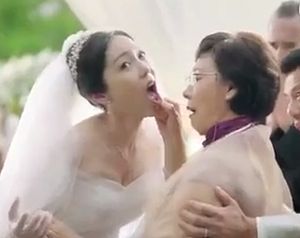Audi, the German luxury vehicles manufacturer, launched a controversial ad in China this week and immediately received a wave of backlash. On July 19, Audi apologized and withdrew the commercial completely.
In the commercial, which was broadcast in China, a mother-in-law rushes to a wedding ceremony and inspects the bride, right in front of the groom and all the other wedding attendees.
To check whether the bride is up to standard, the mother-in-law grabs the bride’s nose, ears, and lips and inspect her teeth and tongue. In the end, the mother-in-law even hints at checking the bride’s breasts.
The ad then notes that “an important decision must be made carefully,” by comparing buying a used car to finding a wife. “Only with an official certification can you rest easy,” the ad concluded.
Unsurprisingly, the ad triggered huge amount of criticism right away.
Many Chinese netizens condemned Audi for sexism and objectification of women. Some netizens commented on the ad: “How dare you check a woman like a livestock?” and others directly complained to Audi through emails.
On July 19, Audi apologized for the ad, yet not publicly on its website, but through one-on-one emails to whoever complained to Audi.
In the apology statement, Audi said that it “deeply regrets” the ad, adding that while “the ad’s perception that has been created for many people, it does not correspond to the values of our company in any way.” Now the ad has been completely withdrawn.
Meanwhile, Audi has repeatedly emphasized that the responsible department is its joint venture in China, as the ad was created by this division and was “produced exclusively for the Chinese market.”
Audi added that “the responsible department of the joint venture has arranged a thorough investigation of the internal control and coordination processes so that an incident like this can be excluded in the future.”
According to Advertising Age, the ad was made by Ogilvy & Mather Beijing, under the theme of “know what you’re getting.” And in another spot under the theme, it’s a boyfriend who gets compared to a used car. But up till now, Ogilvy China hasn’t commented on the controversy.
It’s noteworthy that, in recent years, the trend of objectifying women is growing in China. As The Diplomat has reported repeatedly, quite a few slogans have been coined to smear single Chinese women in particular, such as “unmarried youth in old age” (although no one knows what age range a “youth in old age” falls into) , “leftover women” (women who remain unmarried in their late 20s and beyond), and “single dogs ” (all single people, both male and female, have been referred to as dogs).
Charlotte Gao holds a MA degree in Asian Studies. Her research interests center around East Asian topics. She has worked in the past as a news editor, reporter, and writer for multiple traditional, online, and new media outlets.
































